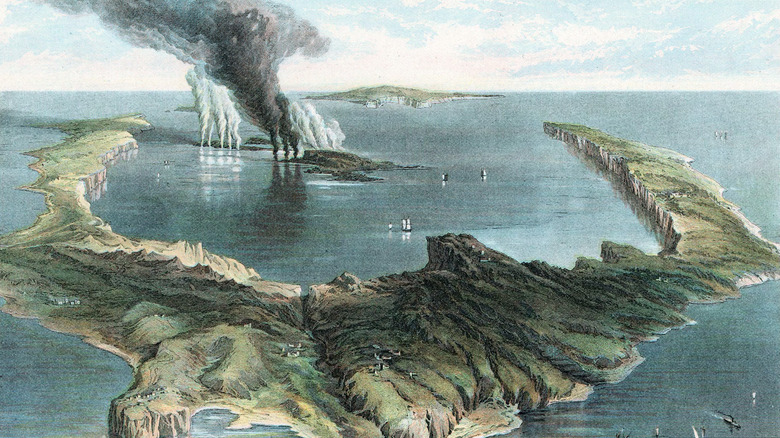This Theory Connects Atlantis And Antarctica
Few legends have endured over time and across the globe like that of Atlantis — a civilized nation said to have turned arrogant and been destroyed by God. Made famous by medieval European authors like Plato, Britannica reports that this seemingly tall tale likely spread via Arab geographers, a spicy tidbit to be traded and carried from mouth to ear all along the Red Sea.
As the story passed from one nation to another like grounds of coffee or aromatic spices, the legend of Atlantis influenced worlds both real and imagined, captivating poets, dreamers, and political enthusiasts alike. The idea of a utopian society spiraling out of control as a result of its own arrogance only to be destroyed by God strikes a note of intrigue no matter what language it is told in. "Timaeus" and "Critias," both works by Plato that feature the fictional setting in the manner it's described above, heralded this legend into our modern era.
For many people, the search for this sunken city is a true-to-life endeavor. According to Discover Magazine, this search has gone on for thousands of years. People have theorized that Atlantis is Spain, Bermuda, Greece, or even America. Interestingly, one theory that gained traction for some time was the notion that Atlantis is Antarctica.
One theory suggests that Antarctica is actually Atlantis
In the thousands of years spent searching for the lost city of Atlantis, there isn't a whole lot of information to reference. According to History, Plato described Atlantis as "an island larger than Libya and Asia Minor put together." Its precise location is perhaps intentionally vague, making it a hot topic amongst those who believe it exists. What is known is that it met its end via a divinely inspired series of earthquakes and floods — if any of this happened at all. For this reason, many adventure enthusiasts begin their search for Atlantis beneath the rippling ocean surface (via National Ocean Service). However, noted author and professor Charles Hapgood thought the legendary island to be hidden directly in plain sight. From his perspective, it was altered as opposed to sunken, a once temperate island displaced as the result of Earth's shifting crust. He believed it to be Antarctica (via History).
According to Hapgood's theory, which was incidentally supported by none other than Albert Einstein, Antarctica was once a tropical paradise and home to the advanced utopian city of Atlantis. When Earth's crust shifted abruptly, the ill-fated Atlantis was thrust into the icy atmosphere we know as modern-day Antarctica. If Hapgood's theory held water, forlorn civilians and artifacts of Atlantis would likely be wedged between layers of arctic ice. Our more recent knowledge of plate tectonics largely debunks this proposition, but there are still some people who believe it.

